人教版高中英语必修四第四单元学案自编
高中英语必修4Unit4教案
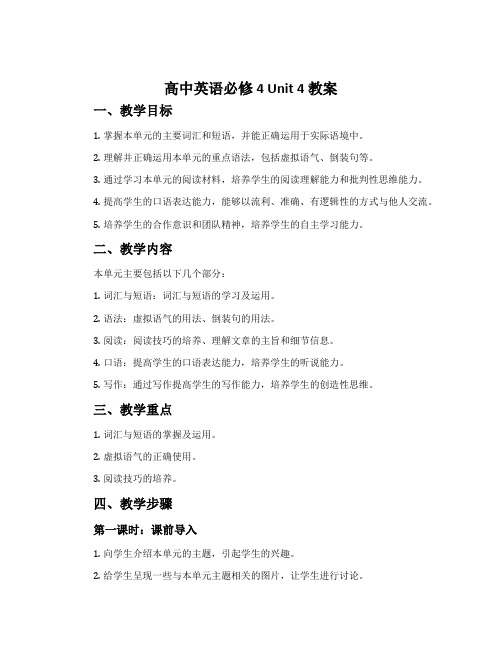
高中英语必修4 Unit 4 教案一、教学目标1.掌握本单元的主要词汇和短语,并能正确运用于实际语境中。
2.理解并正确运用本单元的重点语法,包括虚拟语气、倒装句等。
3.通过学习本单元的阅读材料,培养学生的阅读理解能力和批判性思维能力。
4.提高学生的口语表达能力,能够以流利、准确、有逻辑性的方式与他人交流。
5.培养学生的合作意识和团队精神,培养学生的自主学习能力。
二、教学内容本单元主要包括以下几个部分:1.词汇与短语:词汇与短语的学习及运用。
2.语法:虚拟语气的用法、倒装句的用法。
3.阅读:阅读技巧的培养、理解文章的主旨和细节信息。
4.口语:提高学生的口语表达能力,培养学生的听说能力。
5.写作:通过写作提高学生的写作能力,培养学生的创造性思维。
三、教学重点1.词汇与短语的掌握及运用。
2.虚拟语气的正确使用。
3.阅读技巧的培养。
四、教学步骤第一课时:课前导入1.向学生介绍本单元的主题,引起学生的兴趣。
2.给学生呈现一些与本单元主题相关的图片,让学生进行讨论。
3.向学生提出一个问题,引导他们思考本单元的学习目标。
第二课时:词汇与短语学习1.给学生呈现本单元的词汇和短语,帮助他们掌握词汇的拼写和词义。
2.进行词汇和短语的操练,包括填空、连线和造句等活动。
第三课时:语法学习1.介绍虚拟语气的基本概念和用法,帮助学生理解虚拟语气的意义和作用。
2.通过例句和练习,让学生掌握虚拟语气的具体用法。
第四课时:阅读技巧培养1.向学生介绍阅读技巧的重要性,引导他们了解如何提高阅读理解能力。
2.给学生呈现一篇有关本单元主题的阅读材料,让学生独立阅读并回答相关问题。
3.分析阅读材料的结构和语言特点,引导学生从不同角度理解文章的意义。
第五课时:口语表达能力培养1.给学生提供一些与本单元主题相关的情景,让学生进行角色扮演并进行对话练习。
2.引导学生用所学到的词汇和短语进行口语表达,改进他们的口语表达能力。
第六课时:写作能力培养1.向学生介绍本单元写作任务的要求和目标。
高中英语人教版必修4-Unit4-Revision-学案

主观的 1 4 .a d j . 二、 短语互译 2.很 可 能
4.舒 适 5.丢 脸
1. a p p r o a c h 2 . c u r i o u s3 . m a j o r4 . e a s e 5 . r e p r e s e n t6 . d e f e n d 7. b e l i k e l y t o 8. d e f e n d a g a i n s t
真实地; 真诚地; 真正地 22 . t r u l y adv. 错误的; 假的 23 . f a l s e adj. 怒气; 怒 24 . a n g e r n. 火 主 25 . s u b j e c t i v e adj. 观的 拥抱 2 6 . h u g v i . &v t .
.
8 . o n t h e c o n t r a r 正相反 y 9 . e v e n i f 即使 1 0 . g o c r a z y 发疯
; 象 3. r e p r e s e n t vt .代 表 联系; 联 4 a s s o c i a t i o n n.社 团 ; 征. 想 宿舍 5. d o r m i t o r y n . 飞 行 ; 航 6. f l i g h t n. 班 7. c u r i o u s adj. 好奇的 好奇 8. c u r i o u s l y adv. 地 靠近; 走 近 n. 接近; 方法 9. a p p r o a c h vt.&vi. ; 途径 保护; 保卫 10 . d e f e n d vt. 防御; 保 11 . d e f e n c e n. 卫 主要 12 . m a j o r adj. 的 误解; 误会 13 . m i s u n d e r s t a n d vt.
人教版必修四 Book4 Unit4学案
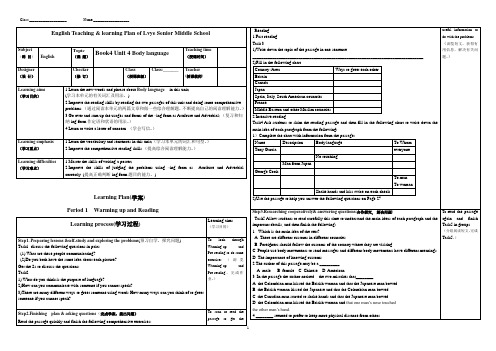
Step3.Researching cooperatively& answering questions(合作探究,解决问题)Learn the usages of the following language points and answer some questions in groups.1.Yesterday,another student and I, representing our university,s student association, went to the Capital International Airport to meet this year,s international students. (P26)昨天,我和另一个同学代表我们大学的学生会去首都国际机场迎接今年的国际学生。
【词语拓展】represent v.代表,体现,表达(意见,观点等)representation n.描绘,表现,陈述representative adj.典型的,代表性的n.代表,代理人【词语运用】根据括号内的汉语提示完成句子。
(1)The dove_____________________.(象征和平)(2)Why do you__________________?(把这事说成这样)(3)I suggest that we establish Mr. Jeffrey _____________ . (作为我们的代表)2.The first person to arrive is Tony Garcia from Columbia, closely followed by Julia Smith from Britain.(P26)第一个到达的是从哥伦比亚来的托尼·加西亚,随后紧跟着的是英国的朱莉娅·史密斯。
【词语拓展】follow (1)vt. 跟随,接着(2)vt.遵循,听从,领会,依照……行事the following day 第二天as follows 如下【词语运用】根据括号内的汉语提示完成句子。
人教社新课标高中英语必修四第四单元 Learning about language 导学案

编号:gswhyybx4 (004)文华高中高一英语必修4Unit4 Body LanguagePeriod 4 Learning about Language 导学案班级姓名组名学习目标:1、能理解并掌握动词-ing形式作状语。
2、能进一步理解课文,并找出动词-ing形式作状语的句子。
3、能养成自主学习的习惯和学习方法。
学习重难点:1、能够理解动词-ing 形式作状语的语法知识点。
2、能够摸索出适合自己的学习技巧。
学法指导:自主学习,合作探究学习过程:Step 1 预习热身观察下列从Reading 中选取的句子,并思考探究划线部分与逻辑主语之间的关系及在句子中的功能。
1. Yesterday, another student and I, representing our university's student association, went to theCapital International Airport to meet this year's international students.2. I stood for a minute watching them and then went to greet them.3. She stepped back appearing surprised and put up her hands, as if in defence.4. Then Akira Nagata from Japan came in smiling, together with George Cook from Canada.5. In the same way that people communicate with spoken language, they also express their feelings using unspoken “language” through physical distance.自我总结:以上句子中都运用了v-ing 形式,与其逻辑主语之间为逻辑上的主动关系,在句中分别相当于非限限制性定语从句,2,3,4 为状语;1,5 为状语。
高中英语人教版必修4【教学设计】Unit 4
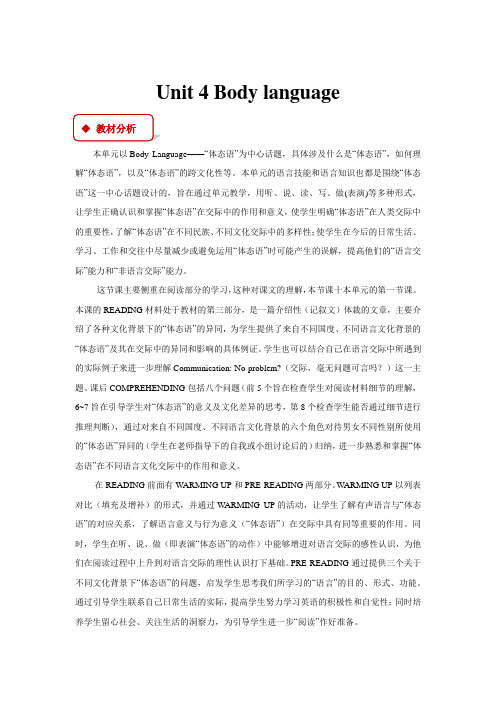
Unit 4 Body language本单元以Body Language——“体态语”为中心话题,具体涉及什么是“体态语”,如何理解“体态语”,以及“体态语”的跨文化性等。
本单元的语言技能和语言知识也都是围绕“体态语”这一中心话题设计的,旨在通过单元教学,用听、说、读、写、做(表演)等多种形式,让学生正确认识和掌握“体态语”在交际中的作用和意义,使学生明确“体态语”在人类交际中的重要性,了解“体态语”在不同民族、不同文化交际中的多样性;使学生在今后的日常生活、学习、工作和交往中尽量减少或避免运用“体态语”时可能产生的误解,提高他们的“语言交际”能力和“非语言交际”能力。
这节课主要侧重在阅读部分的学习,这种对课文的理解,本节课十本单元的第一节课。
本课的READING材料处于教材的第三部分,是一篇介绍性(记叙文)体裁的文章,主要介绍了各种文化背景下的“体态语”的异同,为学生提供了来自不同国度、不同语言文化背景的“体态语”及其在交际中的异同和影响的具体例证。
学生也可以结合自己在语言交际中所遇到的实际例子来进一步理解Communication: No problem?(交际,毫无问题可言吗?)这一主题。
课后COMPREHENDING 包括八个问题(前5个旨在检查学生对阅读材料细节的理解,6~7旨在引导学生对“体态语”的意义及文化差异的思考,第8个检查学生能否通过细节进行推理判断),通过对来自不同国度、不同语言文化背景的六个角色对待男女不同性别所使用的“体态语”异同的(学生在老师指导下的自我或小组讨论后的)归纳,进一步熟悉和掌握“体态语”在不同语言文化交际中的作用和意义。
在READING前面有WARMING UP和PRE-READING 两部分。
W ARMING UP以列表对比(填充及增补)的形式,并通过W ARMING UP的活动,让学生了解有声语言与“体态语”的对应关系,了解语言意义与行为意义(“体态语”)在交际中具有同等重要的作用。
高中英语人教版必修4Unit4教案
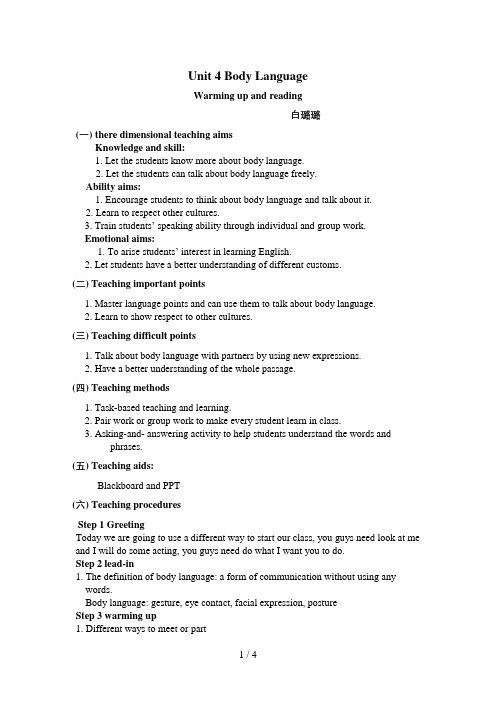
Unit 4 Body LanguageWarming up and reading白璐璐(一)there dimensional teaching aimsKnowledge and skill:1. Let the students know more about body language.2. Let the students can talk about body language freely.Ability aims:1. Encourage students to think about body language and talk about it.2. Learn to respect other cultures.3. Train students’ speaking ability through individual and group work.Emotional aims:1. To arise students’ interest in learning English.2. Let students have a better understanding of different customs.(二) Teaching important points1. Master language points and can use them to talk about body language.2. Learn to show respect to other cultures.(三) Teaching difficult points1. Talk about body language with partners by using new expressions.2. Have a better understanding of the whole passage.(四) Teaching methods1. Task-based teaching and learning.2. Pair work or group work to make every student learn in class.3. Asking-and- answering activity to help students understand the words andphrases.(五) Teaching aids:Blackboard and PPT(六) Teaching proceduresStep 1 GreetingToday we are going to use a different way to start our class, you guys need look at me and I will do some acting, you guys need do what I want you to do.Step 2 lead-in1. The definition of body language: a form of communication without using anywords.Body language: gesture, eye contact, facial expression, postureStep 3 warming up1. Different ways to meet or partShow some pictures about how to greet and how to say goodbye to each other.2. Do the gestureShow some picture about gesture and give the explanation of its different meanings. Step 4 ReadingTask 1 Fast readingRead the passage carefully and divide the passage into 4 parts. Match the main idea of each part.Para 1 A.Different people have different body language.Para 2&3 B. Summary of body language.Para 4 C. Meet the visitors at the airport.Para 5 D. People from different countries express greetings in differentways.Task 2 careful readingRead the first paragraph carefully and finish the T or F questions( T ) 1. Yesterday, another student and I, representing our university's student association, went to the Capital International Airport to meet this year'sinternational students.( F ) 2. After an hour of waiting for their flight to arrive, I saw several young people enter the waiting area looking around curiously.( T ) 3. I stood for a minute watching them and then went to greet them.Read the second and third paragraph carefully and match the left with the right column.Mr Garcia (Columbia) Julia Smith (Britain)Darlene Coulon (France) Akria Nagata (Japan)George Cook (Canada) 1.shakes hands and kisses others twiceon each cheek2.approaches others closely andtouches their shoulder and kissesthem on the cheek3.does not stand very close to others ortouch strangers4.bows5.shakes handFind out the two mistakes the writer found in the airport: Mr. Garcia from He approaches Ms Smith(Columbia)________ The firstmistakeJulia Smith from She ______ ________ appearing_________Garcia.a Japanese He ________ to Mr. Cook and his nose _________ Mr.Cook’s _______ ________.The secondmistakeJapanese.Task 3. careful readingListen the rest part carefully and choose the right answer.1.Besides spoken language, people also use “unspoken language” through___.A.physical distanceB. actionsC. postureD. all above2. ___ prefer to bow rather than kiss others on the cheek.A.The FrenchB. The JapaneseC. The AmericanD. The Chinese3. Which countries approach others closely expect___.A. AmericaB. SpainC. ItalyD. England4. Why do we need study international customs?A.avoid difficultiesB. for funC.go to study abroadD. international communicationTask 4 Post readingAnswer the following questions1. “When in Rome, do as the Romans do.” What do you think this famous saying means?This saying means that when we are in a certain place, we should follow the customs of the people who live in that place, not our own customs.2. Did any students have similar greeting customs? If so, which ones?Yes. Tony from Colombia and Darlene from France had a similar greeting custom—a kiss. George from Canada and Ahmed from Jordan also had a similar greeting custom—a handshake, but Ahmed shakes hands only with men.Step 5 DiscussionGive a speech about how different countries greet others. Your speech should include the following information.You may start like this:It is my great honor to give you a speech here.As we all know ,not all cultures greet each other the same way. In France, …It’s necessary to learn about some body language, because it can reduce some misunderstanding and avoid difficulties in communications.Step 6 Daily sentencesWhen in Rome, do as the Romans doStep 7 EntertainmentCan you guess what the following gesture from Japan means?Step 8 Homework➢Recite the new words of unit 4 and prepare for next period.➢Finish the exercise I on page 27➢内容总结➢➢。
人教版高中英语必修四第四单元词汇教学精品学案
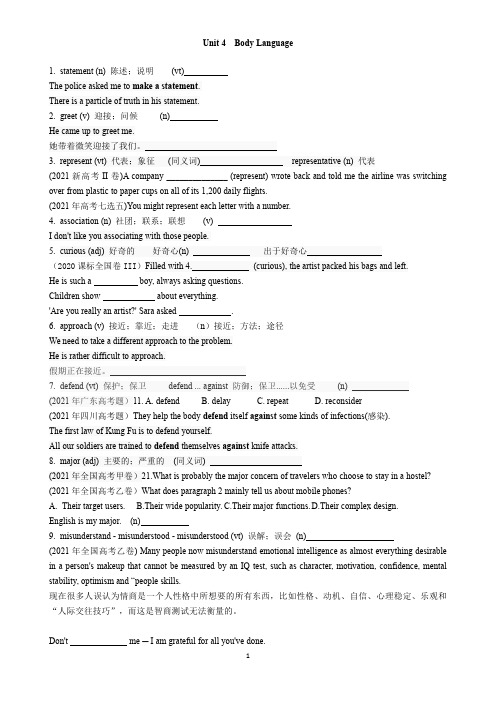
Unit4Body Language1.statement(n)陈述;说明(vt)The police asked me to make a statement.There is a particle of truth in his statement.2.greet(v)迎接;问候(n)He came up to greet me.3.(2021新高考II卷)A company______________(represent)wrote back and told me the airline was switching over from plastic to paper cups on all of its1,200daily flights.(2021年高考七选五)You might represent each letter with a number.4.association(n)社团;联系;联想(v)I don't like you associating with those people.5.(2020课标全国卷He is such a boy,always asking questions.Children show about everything.'Are you really an artist?'Sara asked.6.approach(v)接近;靠近;走进(n)接近;方法;途径We need to take a different approach to the problem.He is rather difficult to approach.7.(2021年广东高考题)11.A.defend B.delay C.repeat D.reconsider(2021年四川高考题)They help the body defend itself against some kinds of infections(感染).The first law of Kung Fu is to defend yourself.All our soldiers are trained to defend themselves against knife attacks.8.(2021年全国高考甲卷)21.What is probably the major concern of travelers who choose to stay in a hostel? (2021年全国高考乙卷)What does paragraph2mainly tell us about mobile phones?A.Their target users.B.Their wide popularity.C.Their major functions.D.Their complex design.English is my major.(n)9.misunderstand-misunderstood-misunderstood(vt)误解;误会(n)(2021年全国高考乙卷)Many people now misunderstand emotional intelligence as almost everything desirable in a person's makeup that cannot be measured by an IQ test,such as character,motivation,confidence,mental stability,optimism and“people skills.现在很多人误认为情商是一个人性格中所想要的所有东西,比如性格、动机、自信、心理稳定、乐观和“人际交往技巧”,而这是智商测试无法衡量的。
高一英语人教版必修四第四单元学案设计+答案
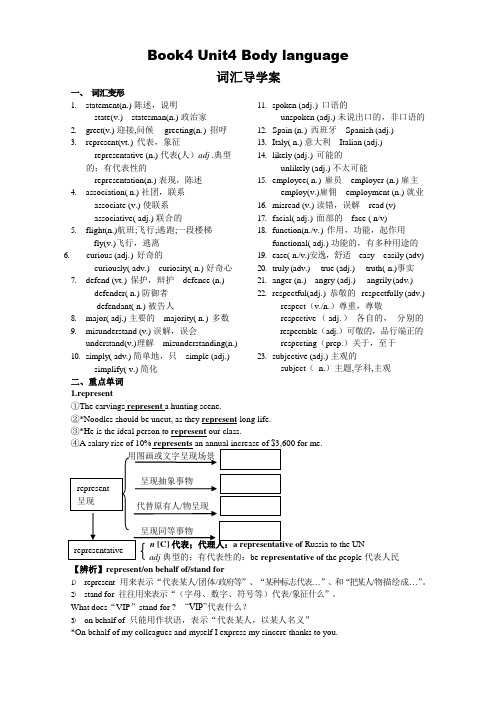
一、 词汇变形Book4 Unit4 Body language 词汇导学案1. statement(n.) 陈述,说明 ---state(v.)---statesman(n.) 政治家2. greet(v.) 迎接,问候- --greeting(n.) 招呼3. represent(vt.) 代表,象征 ---representative (n.) 代表(人)adj .典型的;有代表性的 ---representation(n.) 表现,陈述4. association( n.) 社团,联系 ---associate (v.) 使联系 ---associative( adj.) 联合的5. flight(n.)航班;飞行;逃跑;一段楼梯 ---fly(v.)飞行,逃离6. curious (adj.) 好奇的 ---curiously( adv.)---curiosity( n.) 好奇心7. defend (vt.) 保护,辩护---defence (n.)---defender( n.) 防御者--- defendant( n.) 被告人8. major( adj.) 主要的---majority( n.) 多数9. misunderstand (v.) 误解,误会understand(v.)理解---misunderstanding(n.)10. simply( adv.) 简单地,只---simple (adj.)---simplify( v.) 简化二、重点单词1.represent①The carvings represent a hunting scene.11. spoken (adj.) 口语的---unspoken (adj.) 未说出口的,非口语的12. Spain (n.) 西班牙---Spanish (adj.)13. Italy( n.) 意大利---Italian (adj.)14. likely (adj.) 可能的 ---unlikely (adj.) 不太可能15. employee( n.) 雇员---employer (n.) 雇主 ---employ(v.)雇佣---employment (n.) 就业16. misread (v.) 读错,误解---read (v)17. facial( adj.) 面部的---face ( n/v)18. function(n./v.) 作用,功能,起作用functional( adj.) 功能的,有多种用途的19. ease( n./v.)安逸,舒适---easy---easily (adv)20. truly (adv.) ---true (adj.) ---truth( n.)事实21. anger (n.)---angry (adj.) ---angrily (adv.) 22. respectful(adj.) 恭敬的--respectfully (adv.) ---respect (v./n.)尊重,尊敬 ---respective ( adj. ) 各自的, 分别的 ---respectable (adj.)可敬的,品行端正的 ---respecting (prep.)关于,至于 23. subjective (adj.) 主观的 ---subject ( n.)主题,学科,主观 ②*Noodles should be uncut, as they represent long life.③*He is the ideal person to represent our class.④A salary rise of 10% representsan annual increase of $3,600 for me.Russia to the UN be representative of the people 代表人民【辨析】represent/on behalf of/stand for1) repre s ent 用来表示“代表某人/团体/政府等”、“某种标志代表…”、和“把某人/物描绘成…”。
高中英语(人教版必修四)学案 Unit 4 Period One含答案
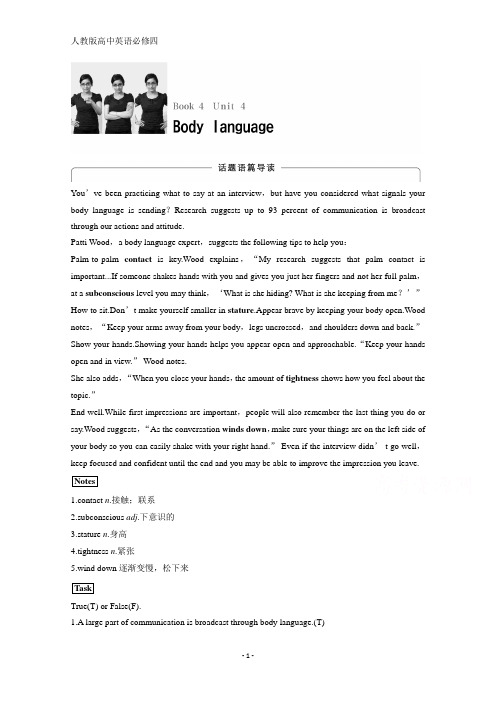
You’ve been practicing what to say at an interview,but have you considered what signals your body language is sending?Research suggests up to 93 percent of communication is broadcast through our actions and attitude.Patti Wood,a body language expert,suggests the following tips to help you:Palm-to-palm contact is key.Wood explains,“My research suggests that palm contact is important...If someone shakes hands with you and gives you just her fingers and not her full palm,at a subconscious level you may think,‘What is she hiding? What is she keeping from me?’”How to sit.Don’t make yourself smaller in stature.Appear brave by keeping your body open.Wood notes,“Keep your arms away from your body,legs uncrossed,and shoulders down and back.”Show your hands.Showing your hands helps you appear open and approachable.“Keep your hands open and in view.” Wood notes.She also adds,“When you close your hands,the amount of tightness shows how you feel about the topic.”End well.While first impressions are important,people will also remember the last thing you do or say.Wood suggests,“As the conversation winds down,make sure your things are on the left side of your body so you can easily shake with your right hand.” Even if the interview didn’ t go well,keep focused and confident until the end and you may be able to improve the impression you leave. Notes1.contact n.接触;联系2.subconscious adj.下意识的3.stature n.身高4.tightness n.紧张5.wind down逐渐变慢,松下来TaskTrue(T) or False(F).1.A large part of communication is broadcast through body language.(T)2.Wood suggests keeping your hands under the table at an interview.(F)Period One Warming Up,Pre-reading & ReadingⅠ.单词检测1.statement n.陈述;说明2.greet v i.& v t.迎接;问候greeting n.问候3.represent v t.代表;象征4.association n.社团;联系;联想5.curious adj.好奇的curiously ad v.好奇地curiosity n.好奇心6.approach v t.& v i.接近;靠近;走近;n.接近;方法;途径7.defend v t.保护;保卫defence n.防御;保卫8.major adj.主要的9.misunderstand v t.误解;误会misunderstanding n.误解;误会10.dash v i.猛冲;突进11.adult n.成人;成年人;adj.成人的;成熟的12.spoken adj.口语的unspoken adj.未说出口的;非口语的13.likely adj.可能的14.crossroads n.十字路口Ⅱ.短语检测1.on the contrary 相反地2.be likely to...很可能……;有希望……3.in general 总的来说;通常Ⅰ.阅读课文,匹配各段落的大意Para.1(B) A.To suggest studying international customs.Paras.2&3(C) B.To meet the international students at the Capital International Airport.Para.4 (D) C.To introduce the students to each other and explain their different ways of greeting. Para.5 (A) D.To explain different cultural “body language” in some countries.Ⅱ.阅读课文,判断正(T)误(F)1.The writer will meet the students at a station.(F)2.The writer waited for a long time before the flight arrived.(F)3.The writer went to greet them as soon as the international students appeared.(F)4.We would take them first to their dormitories and then to the student canteen.(T)Ⅲ.课文阅读理解1.Where is Tony Garcia from?A.Britain.B.Japan.C.Colombia.D.Canada.答案 C2.From Paragraph 2 we know that Japanese prefer to when they are introduced to others.A.bowB.shake handsC.kiss each otherD.touch others’ shoulders答案 A3.According to the text,men from the Middle East often .A.nod heads and wave hands to girlsB.touch others’ heads when they first meetC.kiss each other twice on each cheek when they are introduced to othersD.stand quite close to other men when they talk答案 D4.From the text,we can know that .A.people are likely to keep the same distance in different countriesB.men from Muslim countries often stand close to others to shake handsC.people from the same culture may greet each other in different waysD.body language has nothing to do with our life and communication答案 C5.From the text,we can infer that people .A.are facing multicultural communication problemsB.are trying to make progress in English learningC.need to know more people and make friends with themD.are doing business with each other答案 AⅣ.难句分析1.After half an hour of waiting for their flight to arrive,I saw several young people enter the waiting area looking around curiously.句式分析:本句为简单句,after half an hour of waiting for their flight to arrive为介词短语作状语,enter the waiting area作宾补,looking around curiously作伴随状语。
人教版高中英语必修4 Unit4 单元教学设计

Unit4 单元教学设计Part 1: Teaching Design(第一部分:教学设计)Period 1: A sample lesson plan for reading(COMMUNICATION: NO PROBLEM?)AimsTo develop reading abilityTo learn something about body languageProceduresI. Warming upWarming up by actingLook at the list of interpretation on the right side of the chart. Perform the action or the nonverbal behavior on the left side.Examples of Body LanguageWarming up by defining—What is body language?II. Pre-reading1. Looking and sayingLook at the man in the picture below. What does he say to you by his body language? Basically, how the ...... do I know? Or, I don’t know nothing! The shoulders are hunched and the hands are open signifying a big question mark.2. Talking and sharing*Body language is the quiet, secret and most powerful language of all!*According to experts, our non-verbal language communicates about 50% of what we really mean (voice tonality contributes 38%) while words themselves contribute a mere 7%.*Our bodies send out messages constantly and often we don’t recognize that we’re communicating a lot more than we realize.*Our understanding and use of non-verbal cues in facial expression are familiar to us nearly from birthIII. Reading1. Listening and reading aloudNow please listen and then read aloud to the recording of the text COMMUNICATION: NO PROBLEM? Pay attention to the pronunciation of each word and the pauses within each sentence.2. Reading and underliningNext you are to read and underline all the useful expressions or collocations in the passage. Copy them to your notebook after class as homework.。
高中英语人教版:必修四 unit 4 grammar 学案

必修四Unit 4 Grammar【学习目标】:V-ing 形式在句中作定语和状语【学习重点】:V-ing 形式在句中作状语【学习难点】:独立主格结构【教学过程】:V-ing 形式在句中作定语和状语是本单元的学习重点。
1、作定语⑴ V-ing 形式可以单独充当名词的前置修饰语,A swimming pool A sleeping carworking people the rising sun⑵-ing形式短语作定语时一般放在它所修饰的名词之后, 相当于一个定语从句。
They are visitors coming from several countries.The boy standing there is a classmate of mine.2、作状语可以表示时间, 原因, 结果,条件, 行为方式或伴随动作等。
Being poor, he couldn’t afford a TV set.Working hard, you’ll surely succeed.Hearing the news, he got frightened.Not knowing his telephone number, I couldn’t get in touch with him.She stood waiting for a bus.He sat there reading a book.The students ran out of the classroom, talking and laughing.Her husband died, leaving her four children.注意:⑴当v-ing形式所表示的动作发生在谓语动词动作之前时,应使用完成式:having done Having finished his homework, he rushed out to play basketball.练习:___________________a reply, he decided to wait again.()A. No receivingB. Receiving notC. Not having receivedD. Having not received分析:在 V-ing 形式的否定式中,否定词( no 、 not 或 never )应置于其前面,不能置于其后面。
高中英语必修四第四单元学案1
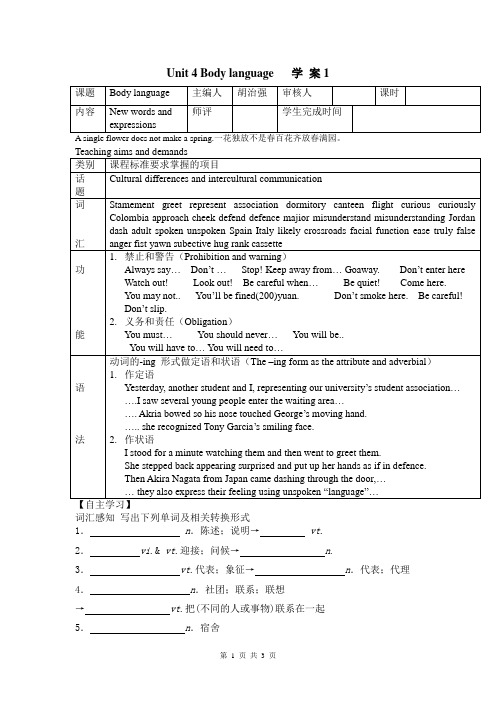
Unit 4 Body language 学案1词汇感知写出下列单词及相关转换形式1.n.陈述;说明→vt.2.vi.& vt.迎接;问候→n.3.vt.代表;象征→n.代表;代理4.n.社团;联系;联想→vt.把(不同的人或事物)联系在一起5.n.宿舍6.adj.好奇的→adv.好奇地→n. 7.vt.& vi.接近;靠近;走近n.接近;方法;途径8.n.面颊9.vt.保护;保卫→n.防御;保卫10.vt.误解;误会→n.误解;误会11.vi.猛冲;突进12.adj.可能的13.n.作用;功能;职能vi.起作用;运转→adj.功能的14.n.安逸;舒适vt.减轻(痛苦、忧虑)15.n.怒气;怒火16.adj.主观的→adv.主观地→adj.客观的17.vi.& vt.拥抱18.n.等级;军衔重点短语1.保卫……以免受2.很可能……;有希望……3.总的来说;通常4.舒适;快活;自由自在5.丢脸6.背对;背弃7.对……感到好奇【当堂检测】语境活用(用单词的正确形式填空)1. The PRC ________(代表) the People’s Republic of China .2. They live in the same ________(宿舍).3. At noon ,students are in the _______(食堂) for lunch .4. Their _______(航班) number is 9573.5. Children are _______(好奇) about everything .6. A tourist _______(接近) us and asked us the way to Windsor Castle .7. Their ________(好奇) is good for their future development .8. Tears rolled down his ________(面颊).9. The surgeon is doing a ______(主要的) operation .10.There are different _______(方法) to language learning .11.He _______(误解) his partner and glared at him.12.The film is intended for _______(成人) .13. The most universal _______(面部的)expression ,of course ,the smile .14. The machine ________(运转) well .15. There has been a close ______(联系) between these two companies .16. He________(迎接/问候)all the guests warmly as they arrived.17. She gave her son a________(拥抱)and let him go to bed.学案1当堂检测答案:1.represents/stands for 2.dormitory 3.canteen4.flight5.curious6.approached7.curiosity8.cheeks9.major10.approaches 11.misunderstood 12.adults 13.facial 14.functions15.association 16.greeted 17.hug【学后记】:。
高中英语人教版2019选择必修第四册Unit4单元复习导学案学生版
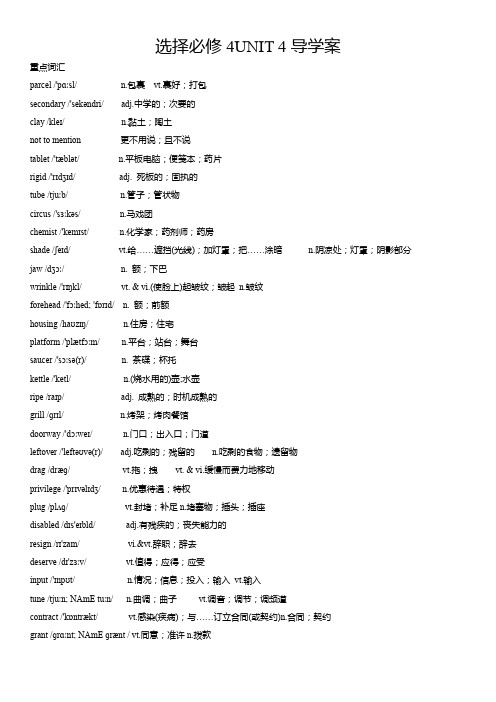
选择必修4UNIT 4导学案重点词汇parcel /'pɑːsl/ n.包裹vt.裹好;打包secondary /'sekəndri/ adj.中学的;次要的clay /kleɪ/ n.黏土;陶土not to mention 更不用说;且不说tablet /'tæblət/ n.平板电脑;便笺本;药片rigid /'rɪdʒɪd/ adj. 死板的;固执的tube /tjuːb/ n.管子;管状物circus /'sɜːkəs/ n.马戏团chemist /'kemɪst/ n.化学家;药剂师;药房shade /ʃeɪd/ vt.给……遮挡(光线);加灯罩;把……涂暗n.阴凉处;灯罩;阴影部分jaw /dʒɔː/ n. 额;下巴wrinkle /'rɪŋkl/ vt. & vi.(使脸上)起皱纹;皱起n.皱纹forehead /'fɔːhed; 'fɒrɪd/ n. 额;前额housing /haʊzɪŋ/ n.住房;住宅platform /'plætfɔːm/ n.平台;站台;舞台saucer /'sɔːsə(r)/ n. 茶碟;杯托kettle /'ketl/ n.(烧水用的)壶;水壶ripe /raɪp/ adj. 成熟的;时机成熟的grill /ɡrɪl/ n.烤架;烤肉餐馆doorway /'dɔːweɪ/ n.门口;出入口;门道leftover /'leftəʊvə(r)/ adj.吃剩的;残留的n.吃剩的食物;遗留物drag /dræɡ/ vt.拖;拽vt. & vi.缓慢而费力地移动privilege /'prɪvəlɪdʒ/ n.优惠待遇;特权plug /plʌɡ/ vt.封堵;补足n.堵塞物;插头;插座disabled /dɪs'eɪbld/ adj.有残疾的;丧失能力的resign /rɪ'zaɪn/ vi.&vt.辞职;辞去deserve /dɪ'zɜːv/ vt.值得;应得;应受input /'ɪnpʊt/ n.情况;信息;投入;输入vt.输入tune /tjuːn; NAmE tuːn/ n.曲调;曲子vt.调音;调节;调频道contract /'kɒntrækt/ vt.感染(疾病);与……订立合同(或契约)n.合同;契约grant /ɡrɑːnt; NAmE ɡrænt / vt.同意;准许n.拨款take for granted 认为……是理所当然;对……不予重视cardiac /'kɑːdɪæk/ adj.心脏病的;心脏的circuit /'sɜːkɪt/ n. 巡回;环形线路disability /ˌdɪsə'bɪləti / n.缺陷;障碍consultation /ˌkɒnsəl'teɪʃn/ n.咨询;咨询会capsule /'kæpsju:l/ n.胶囊;太空舱relay /'riːleɪ; NAmE rɪ'leɪ/ vt.转发;转播n.接力赛;接班的人relay to 转达给……;转发给……criterion /kraɪ'tɪəriən/ n. (pl. criteria /-riə /) 标准;准则;原则stability /stə'bɪləti / n.稳定(性);稳固(性)pray /preɪ/ vi. &vt.企盼;祈祷pray that 但愿hypothetical /ˌhaɪpə'θetɪkl/ adj.假设的;假定的重点词汇练习parcel /'pɑːsl/ n. ____________ vt.____________ secondary /'sekəndri/ adj. ____________clay /kleɪ/ n. ____________tablet /'tæblət/ n. ________________________/'rɪdʒɪd/ adj. 死板的;固执的tube /tjuːb/ n. ____________circus /'sɜːkəs/ n. ____________chemist /'kemɪst/ n. ____________shade /ʃeɪd/ vt. ____________n____________jaw /dʒɔː/ n. ________________________ /'rɪŋkl/ vt. & vi.(使脸上)起皱纹;皱起n.皱纹forehead /'fɔːhed; 'fɒrɪd/ n. ____________housing /haʊzɪŋ/ n. ________________________ /'plætfɔːm/ n.平台;站台;舞台saucer /'sɔːsə(r)/ n. ____________kettle /'ketl/ n. ________________________ /raɪp/ adj. 成熟的;时机成熟的grill /ɡrɪl/ n. ____________ v ____________doorway /'dɔːweɪ/ n. ____________leftover /'leftəʊvə(r)/ adj. ____________n. ____________drag /dræɡ/ vt. ________________________/'prɪvəlɪdʒ/ n.优惠待遇;特权plug /plʌɡ/ vt____________n. ____________disabled /dɪs'eɪbld/ adj. ________________________/rɪ'zaɪn/ vi.&vt.辞职;辞去____________ /dɪ'zɜːv/ vt.值得;应得;应受input /'ɪnpʊt/ n. ____________ vt. ________________________ /tjuːn; / n.曲调;曲子vt.调音;调节;调频道contract /'kɒntrækt/ vt. ____________;____________n. ____________ grant /ɡrɑːnt; NAmE ɡrænt / vt. ____________n____________cardiac /'kɑːdɪæk/ adj. ____________circuit /'sɜːkɪt/ n. ________________________ /ˌdɪsə'bɪləti / n.缺陷;障碍consultation /ˌkɒnsəl'teɪʃn/ n. ____________capsule /'kæpsju:l/ n. ____________relay /'riːleɪ; NAmE rɪ'leɪ/ vt. ____________n. ____________criterion /kraɪ'tɪəriən/ n. (pl. criteria /-riə /) ____________stability /stə'bɪləti / n. ____________pray /preɪ/ vi. &vt. ____________hypothetical /ˌhaɪpə'θetɪkl/ adj. ____________单元短语再认再现1.a chorus of齐声;异口同声2.not to mention更不用说;且不说3.adapt to适应4.have no concept of没有……的概念5.the other day几天前e across(偶然)遇到7.make a difference起作用;有影响8.to be honest老实说;说实在的9.shake hands with和……握手10.be related to与……相关11.get through穿过;通过12.stick out of伸出13.participate in参加14.upside down上下颠倒的15.dry up枯竭16.take for granted认为……是理所当然;对……不予重视17.prior to在……之前;居先18.relay to转达给……;转发给……19.pray that但愿选词填空1.Having knelt down,the old lady all her children would be safe and sound.2.the beautiful scenery, the city also boasts a vibrant culture and friendly locals.3.Water the plant regularly, never letting the soil4.We often the love and support of our family, only realizing their importance when we face difficulttimes.5.While browsing the library shelves, she an old, dusty book that piqued her interest.6.I don’t know how I’m going to this difficult period in my life.7.making a decision, the team discussed all the possible outcomes.本单元词汇在各校期末试题中的考察1.He got up and____________(拖)his chair towards the table.2.They are those in the British ruling classes who wish to maintain their power and p ________ (rights and advantagesthat rich and powerful people have)by using the age-old tactic of divide and rule.3.Fresh grass had been laid on the floor and there was a ____________(平台)for Jenny and me to sleep on.4.Ovarian cancer is the sixth most common cancer ____________(感染) by women.5.Stephen Hawking, the great physicist, who became __________ (残疾的) and had to sit on the wheelchair all his lifebecause of an incurable disease, made amazing contributions with his strong determination.6.In my opinion, all the common people __________ (值得;应得) more attention than pop stars.7.Knowing that she was admitted to her dream university, she ____________(蹦跳)up and down excitedly on the bed.8.I’ve looked through all my papers but I still can’t find the c___________(合同).9.My o_____________(对手) was the same age and height as myself.10.The minister said no one shall have the p______________(特权) of transcending the law.期末词汇复习(各校期末试卷词汇汇编)11.Both powers agreed to w ________ (撤回) their forces from the region.12.We all hope that men are better, wiser, more__________ (mercy) than they were 10,000 years ago.13.The policeman who______________ (逮捕) him merely thought he was nabbing a smuggler.14.I phoned the doctor in ____________ (恐慌), crying that my father had collapsed.15.I feel so ____________(内疚) of leaving all this to you16.By working together, we can lay a solid ____________(基础) for a promising future. (17.The audience laughed and ____________(鼓掌) happily.18.She laughed in ____________(回应)to his jokes.19.Mutual understanding will create a ____________(和谐的) working atmosphere.20.The exhibition contains something that is_______________ (值得) of remark.21.He’s always been very _______________ (热情的) about sports.22._________ (尊严) and pride run deep in our nation.23._________ (自由) is the natural birthright of every human.24.China highly values ecological and environmental protection, considering Lucid Waters and Lush Mountains as ourproudest ____________(财产) .25.The cave ____________ (延伸) for some 12 miles.26.She pronounced the word very slowly and _________________(精确).27.He stared at the diamonds with _________________(贪婪) eyes.28.Before we ________(抛弃)the ship, Shackleton calmly called us together and told us to rescue our most essentialsupplies.29.She heard him ________(宣称) that he did not want to leave her the next day, and that he felt more than just the desireto please her.30.I am planning to write a book, and I will __________ (给…命名) it The Journey Westward.31.With the __________ (共同的) efforts from the government, scientists and individuals, the effect of Covid-19 has beenunder control.32.The instant I heard that the 4 children were rescued in the Amazon jungle 40 days after the plane crash, I was in a light-hearted __________ (心情).33.I was stuck in the traffic jam so I missed the __________ (预约) with my doctor.词汇变化1.dust n.沙土;灰尘vi.&vt.擦灰→__________adj.布满灰尘的2.__________n.化学家;药剂师;药房→__________adj.化学的→chemistry n.化学3.wrinkle vt.&vi.(使脸上)起皱纹;皱起n.皱纹→__________adj.有皱纹的;显出皱纹的4.house n.住宅;家庭vt.覆盖;给……房子住→__________n.住房;住宅5.ripe adj.成熟的;时机成熟的→__________ vt.使……成熟→__________n.成熟6.disable vt.使失去能力;使残废;→__________adj.有残疾的;丧失能力的→__________n.缺陷;障碍7.resign vi.&vt.辞职;辞去→__________n.辞职;辞职信8.consult v.咨询;请教;商议→__________n.顾问;咨询者;会诊医生9.adjust vi.& vt.调整; (使)适合→ _________n.调整; 适应10.adapt v.适应; 改编→_________n.改编,适应;11.imagine vi&vt.想象→ _________n.想象; 想象力→_________adj.有想象力的→ _________adj.想象中的mit v.犯罪; 把…交托给; 使…承担义务→ _________adj.坚定的; 承担义务的→ ______. 承诺; 许诺; 保证13.He claimed that he had no ________(priority) knowledge of this protest. (所给词的适当形式填空)重点词汇讲解privilege n.优惠待遇;特权1)It is a privilege to do sth.有幸做某事2)have the privilege to do/of doing sth.有做某事的特权3)be privileged to do sth.做某事是荣幸的1.我有机会出国留学并探索不同的文化,为此我感到非常荣幸。
人教新课标高一英语必修四第四单元Unit 4 学案

Unit 4 Body language(Module 4)Period 1 Reading Communication: No Problem?Class:Name:Group:No:Learning Objectives:1.Learn the useful new words and expressions.2.Enable Ss to know about cultural differences and intercultural communication.Learning Key Points:Get students to learn different reading skills, especially the reading ability of understanding implied meaning of the author.Learning Difficult Points:Ss learn how to use different reading skills for different reading purposes.Learning Procedures:I.【Pre-class homework】Assessment:1. What is body language?Body language is one form of nonverbal ______________(交流) without using words. Eye contact or gaze, facial____________, gestures, and __________ (姿势), or the way you stand, are different kinds of body language.2.How many characters(人物)are mentioned in our passage. Who are they?__________________________________________________________3. Do all members of all cultures behave the same way ?__________________________________________________________4. Divide the passage into four parts and then match the main idea of each part with lines.Part1 (Para. ) A. Different people have different body language.Part2 (Para. ) B. Summary of body languagePart3 (Para. ) C. You are sent to CIA to meet this year’s international students.Part4 (Para. ) D. Examples of lear ned or cultural “body language”Ⅱ.【While-class】Assessment:Step1. Lead-inWhat do you think is the purpose of language? How can you communicate with someone if you cannot speak?Step2. Group discussionSs discuss their pre-class homework in groupStep3.Consolidation: Reading comprehensionA. Fast Reading1. What were the two places that they would be taken to?2. What does the writer think of studying international customs?B. Read carefully and fill in the blanks----Find out the two mistakes the writer found in the airport.The first mistake Tony Garcia(from____________)He ________________ Julia Smith by_______________________________ and___________________________________ Julia Smith(from____________)She ____________ back appearing___________ and ___________________away from Tony Garcia.The second mistake Akira Nagata(from____________)He ____________ to George Cook and his___________ touched George Cook’smoving _____________.George Cook(from____________)He ________________________________to Akira Nagata.C. Fill in blanks according to the text.3.Yesterday, another student and I went to CIA to meet the international students. 1.______________ half an hour of waiting for their fight to arrive, I saw several young people enter the waiting area 2. ____________________(look) around curiously. The first3. ___________________ (arrive) was Tony from Colombia. He approached Julia,touched her shoulder and kissed her on 4._______________cheek! She stepped back as if in 5.___________(defend). I guessed there was probably a6._______________(misunderstand). As I get to know more international friends, I’velearned that people communicate 7.______________ spoken language and they also express their feeling 8._______________(use) unspoken “language”. 9._____________ general, studying international customs can certainly help 10._____________ (avoid) difficulties in today’s world of crossroads.Step4.PresentationStep5.SummaryIII.【Post-class】Self- reflectionI enjoyed learning aboutI found these words useful:I found these expressions useful:I have learned aboutSome examples:Keys:【Pre-class homework】munication,expressions,postures2. Seven characters. They are Tony Garcia, JuliaSmith ,Akira Nagata,George Cook, Ahmed Aziz, Darlene Coulon and the writer.3. No, they don’t.4.Part1 (Para. 1 ) You are sent to CIA to meet this year’s international students.Part2 (Para. 2-3 ) Different people have different body language.Part3 (Para.4 ) Examples about cultural “body language”Part 4 (Para. 5 ) Summary of body languageStep3.Consolidation: Reading comprehensionA. Fast Reading1. Their dormitories and the student canteen.2. They can help avoid difficulties in today’s world of cultural crossroads.B. Read carefully and fill in the blanks----Find out the two mistakes the writer found in the airport.The first mistake Tony Carcia(from Columbia)He approached Julia Smith by touching hershoulder and kissing her on the check.Julia Smith(from Britain)She stepped back appearing surprised and tooka few steps away from Tony Garcia.The second mistake Akira Nagata(from Japan)He bowed to George Cook and his nose touchedGeorge Cook’s moving hand.George Cook(from Canada)He reached his hand out to Akira Nagata.C. Fill in blanks according to the text.1. After2. looking3. to arrive4. the5. defence6. misunderstanding7. with8. using9. In 10. avoidPeriod 2 Language focus in Reading 1Class:Name:Group:No:Learning Objectives:4.1.Learn and grasp the important useful new words and expressions.5. 2. Learn the important useful sentences and patterns.6. 3. Make sentences after the useful expressions.Learning Key Points:Ss grasp the usages of such important new words and expressions.Learning Difficult Points:Ss understand some difficult and long sentences.Learning Procedures:I.【Pre-class homework】Assessment:A.Make sentences using the following works and phrases:1. represent2. approach3. be likely to4. in general5. defend…againstB. Imitative writing (句子仿写)1. The first person to arrive was Tony Garcia from Colombia, closely followed by Julia Smith from Britain. 仿句:中国是第一个造纸的国家。
必修四第四单元学案

赤峰市田家炳中学高一英语教学案(三)【学生对练习册认真阅读并理解记忆后,用学案检测自己】动词-ing形式作定语【归纳】★单个的动词-ing形式作定语常位于被修饰名词的前面,既可以表示被修饰成分的性质或用途,也可以表示被修饰成分的动作或状态。
如:The experiment was an amazing success.You can find Jennifer in the reading room.Children in many developing countries can’t get basic medical care.They quickly moved the sleeping man out of the prison.★动词-ing形式还可用在名词后作定语,作用相当于一个定语从句。
如:The village is made up of 490 families belonging (= who belong) to five nationalities.Do you know the woman talking (= who is talking) to Jim?【拓展】动词-ing形式的被动式(being done)也可作定语,表示正在发生的被动动作。
如:We must keep the things being discussed a secret.I knew nothing about the experiment being performed there.动词-ing形式作状语【归纳】★动词-ing形式可作状语,表示时间、条件、原因、让步、结果或伴随情况等,其逻辑主语通常与句子的主语一致,动词-ing形式所表示的动作与主语之间构成逻辑上的主谓关系。
如:Hearing the news, we all jumped with joy.Working hard, you’ll certainly make your dream come true.Seeing nobody at home, he decided to leave them a note.Weighing almost one hundred kilos, the stone was moved by the boy alone.Her husband died in 1960, leaving her with five children.The little girl was lying in bed crying.★动词-ing形式的一般式所表示的动作常与谓语动作同时发生,其完成式(having done)所表示的动作发生在谓语动作之前。
高中英语必修四第四单元教案
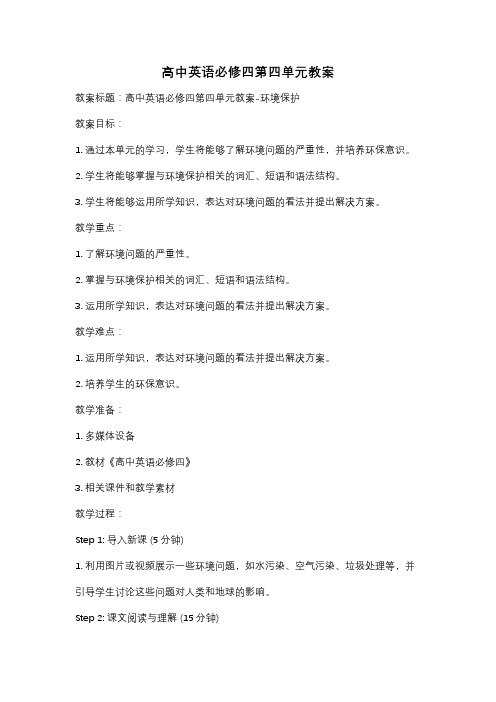
高中英语必修四第四单元教案教案标题:高中英语必修四第四单元教案-环境保护教案目标:1. 通过本单元的学习,学生将能够了解环境问题的严重性,并培养环保意识。
2. 学生将能够掌握与环境保护相关的词汇、短语和语法结构。
3. 学生将能够运用所学知识,表达对环境问题的看法并提出解决方案。
教学重点:1. 了解环境问题的严重性。
2. 掌握与环境保护相关的词汇、短语和语法结构。
3. 运用所学知识,表达对环境问题的看法并提出解决方案。
教学难点:1. 运用所学知识,表达对环境问题的看法并提出解决方案。
2. 培养学生的环保意识。
教学准备:1. 多媒体设备2. 教材《高中英语必修四》3. 相关课件和教学素材教学过程:Step 1: 导入新课 (5分钟)1. 利用图片或视频展示一些环境问题,如水污染、空气污染、垃圾处理等,并引导学生讨论这些问题对人类和地球的影响。
Step 2: 课文阅读与理解 (15分钟)1. 让学生阅读教材第四单元的相关课文,并回答相关问题,以检查学生对课文的理解程度。
2. 引导学生讨论课文中的环境问题,并与他们个人的生活经验相联系。
Step 3: 词汇与短语学习 (15分钟)1. 教授与环境保护相关的词汇与短语,如pollution, recycle, renewable energy 等,并帮助学生掌握其正确的用法和拼写。
2. 设计词汇和短语练习,如填空、造句等,巩固学生的学习成果。
Step 4: 语法学习 (10分钟)1. 介绍并讲解本单元的语法重点,如情态动词should的用法,以及它在环境保护中的应用。
2. 设计语法练习,如改写句子、完成对话等,以巩固学生的语法掌握能力。
Step 5: 讨论与表达 (15分钟)1. 分组讨论,让学生就环境问题展开讨论,并提出解决方案。
2. 鼓励学生积极发言,提供相关词汇和短语的支持,并引导他们运用所学语法结构来表达自己的观点。
Step 6: 小结与作业布置 (5分钟)1. 小结本节课的重点内容,并与学生一起总结所学知识和技能。
- 1、下载文档前请自行甄别文档内容的完整性,平台不提供额外的编辑、内容补充、找答案等附加服务。
- 2、"仅部分预览"的文档,不可在线预览部分如存在完整性等问题,可反馈申请退款(可完整预览的文档不适用该条件!)。
- 3、如文档侵犯您的权益,请联系客服反馈,我们会尽快为您处理(人工客服工作时间:9:00-18:30)。
WorkbookUnit4 Body languagePre-readingPart1. BrainstormingPart2. Check your vocabulary. Guess the Chinese meaning of the word in each sentence and check them in the word list.1. ( ) statement: something that you say or write that gives information or an opinion. Do all of you understand my statement?2. ( ) The hostess greeted everyone with a smile.3. ( ) The circle on this map represent s a city.4. ( ) I am a member of student association. That is to say, I belong to student union.5. ( ) The cat is always curious about everything.6. ( ) when you approach somebody, you get close to them.7. ( ) His cheeks always get red after drinking.8. ( ) Our duty is to defend ourselves against the enemy.9. ( ) dash: to go somewhere very quickly. He dashed off to keep an appointment. 他急忙赶去赴约。
10. ( ) No child could entre without the can adult.11. ( ) We are likely to win.12. ( ) He is tall and handsome though his facial expression never changes.13. ( ) The function of humor is to make yourself and others happy.14. ( ) The news that he has passed the exam would ease his mind.15. ( ) Most students don’t feel at ease with teachers. When they are with their teachers, they always fell nervous.16. ( ) People who truly loved once are far more likely to love again. (曾今沧海难为水,除却巫山不是云。
)17. ( ) True or false?18. ( ) She cried with anger.19. ( ) When learning English, you should enjoy losing your face. Just try.20. ( ) It’s impolite to turn your back to the other when talking.21. ( ) fist22. ( ) To be respectful to your teacher is beneficial(有好处的).23. ( ) In general, our opinions are always subjective. That is to say, our opinions are always based on our own ideas rather than facts.24. ( ) Mum, give me a hug please!25. ( ) He was eager to(急切希望) improve his social rank.While-readingPart1. Read for structure.1.Fast-readingRead to find out the topic sentence and match the main idea of each para. Paragraph1 A. to suggest studying international customs.Paragraph2﹠3 B. to meet the international students at the Capital InternationalAirport.Paragraph4 C. to introduce the students to each and explain their different ways of greeting.Paragraph5 D. to explain different cultural “body language”in some countries.2.Detailed-reading⑴.Who is the first person arriving at the Capital International Airport?A. Julia SmithB. Tony GarciaC. George CookD. Ahmed Aziz⑵. What do Japanese do when meeting others?A. bowB. shake handsC. only smileD. kiss others cheeks⑶. Where is Darlene Coulon from?A. JordanB. SpainC. FranceD. Britain⑷. What can we learn from the passage?A. Never too old to learn.B. When in Rome, do as Romans do.C. Four eyes see more than two.D. Every country has its own customs.⑸. How do people use unspoken language?A. By the movement of their bodies.B. By eye contact.C. By keeping physical distance, actions or posture.D. By moving hands.Part2. Read for language points.1.完型填空Yesterday, another student and I, ______ (represent) our university’s student association, ____ (go) to the Capital International Airport to meet this year’s international students.The first person to arrive was Tony Garcia from Colombia, closely _____ (follow) by Julia Smith from Britain. After I met them and then introduced them to each other, I was very ______ (surprise). Tony approached Julia, touched her shoulder and ______ (kiss) her on the cheek! She stepped back _______ (appear) surprised and put up her hands, as if in defence. There was probably a major _______ (misunderstand).Then Akira Nagata from Japan came in _____ (smile), together with George Cook from Canada. As they were _______ (introduce), George reached his hand out to the Japanese student. Just at that moment, Akira bowed ____ his nose touched George’s ______hand. They both apologized-- _______ cultural mistake.As I met the following international students, I saw even more cultural mistakes between students from different countries._____ I get to know more international friends, I learn more about this cultural “body language”. _____ all cultures greet each other the same way. English people, for example, _____ not usually stand very close to others or touch strangers as soon asthey meet. _______, people from places like Spain, Italy, or South American countries approach others _____ (close) and are more ____ (like) to touch them. Most people around the world now greet each other by _____ (shake) hands, but some cultures use other greetings as well, such as the Japanese, who prefer ____ (bow).In general, _____ (study) international customs can certainly help _____ (avoid) difficulties in today’s world of cultural crossroads.2.重点词汇即学即练⑴Yesterday, another student and I, represent ing our university’s association, went to the Capital International Airport to meet this year’s international students.(p1)昨天,我和另一个学生代表我校的学生会,到首都国际机场迎接今年的留学生。
